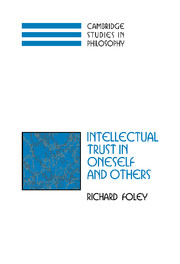Book contents
- Frontmatter
- Contents
- Acknowledgments
- Part One Intellectual Trust in Oneself
- 1 The Importance of Intellectual Self-Trust
- 2 Intellectual Self-Trust, Rational Belief, and Invulnerability to Self-Criticism
- 3 Empirical Challenges to Self-Trust
- Part Two Intellectual Trust in Others and in One's Own Future and Past Self
- Conclusion
- Index
2 - Intellectual Self-Trust, Rational Belief, and Invulnerability to Self-Criticism
Published online by Cambridge University Press: 30 July 2009
- Frontmatter
- Contents
- Acknowledgments
- Part One Intellectual Trust in Oneself
- 1 The Importance of Intellectual Self-Trust
- 2 Intellectual Self-Trust, Rational Belief, and Invulnerability to Self-Criticism
- 3 Empirical Challenges to Self-Trust
- Part Two Intellectual Trust in Others and in One's Own Future and Past Self
- Conclusion
- Index
Summary
CONFIDENCE AND DEPTH
Part of the appeal of classical foundationalism is that it purported to provide the tools for a refutation of skepticism. With the fall of classical foundationalism, we can no longer pretend that such a refutation is possible. We must instead acknowledge that skeptical worries cannot be utterly banished and, as a result, inquiry always involves an element of trust, the need for which cannot be eliminated by further inquiry, whether it be scientific or philosophical.
The trust need not be and should not be unrestricted, however. Unquestioning faith in our faculties and in the opinions they generate is naïve and also risky, given what we know about our own fallibility. Thus, among the most pressing questions for epistemology are ones concerning the limits of self-trust. What degree of intellectual self-trust is it appropriate for us to have in our opinions and faculties, insofar as our goal is to have accurate and comprehensive beliefs? And, what kinds of considerations can undermine this trust?
An approximate answer to the first of these questions, I argue, is that trust in one's opinions ought to be proportionate to the degree of confidence one has in them and to what I call the ‘depth’ of this confidence. Correspondingly, trust in one's intellectual faculties, methods, and practices ought be proportionate to the degree of confidence one has in their reliability and to the depth of this confidence.
- Type
- Chapter
- Information
- Intellectual Trust in Oneself and Others , pp. 25 - 54Publisher: Cambridge University PressPrint publication year: 2001



